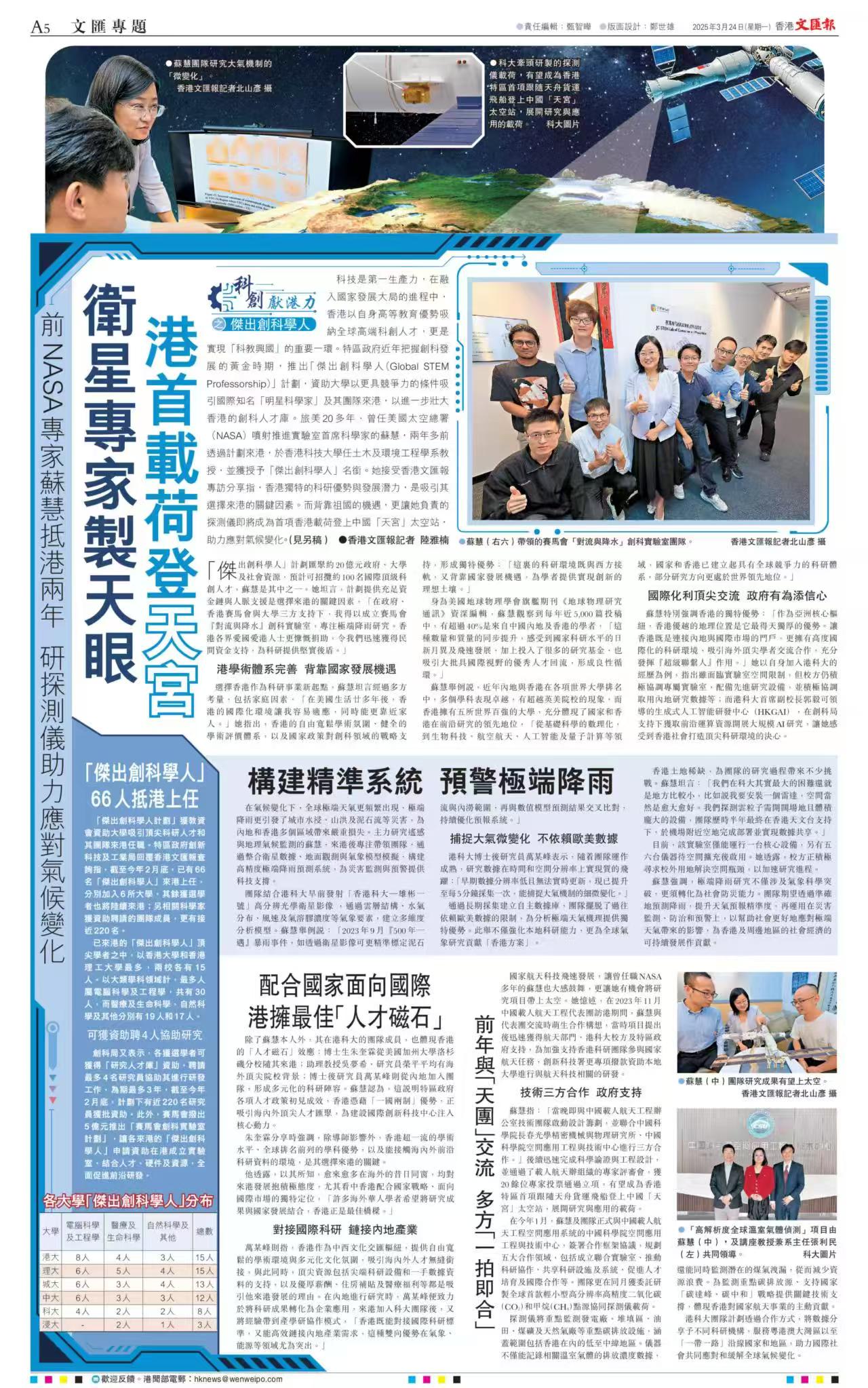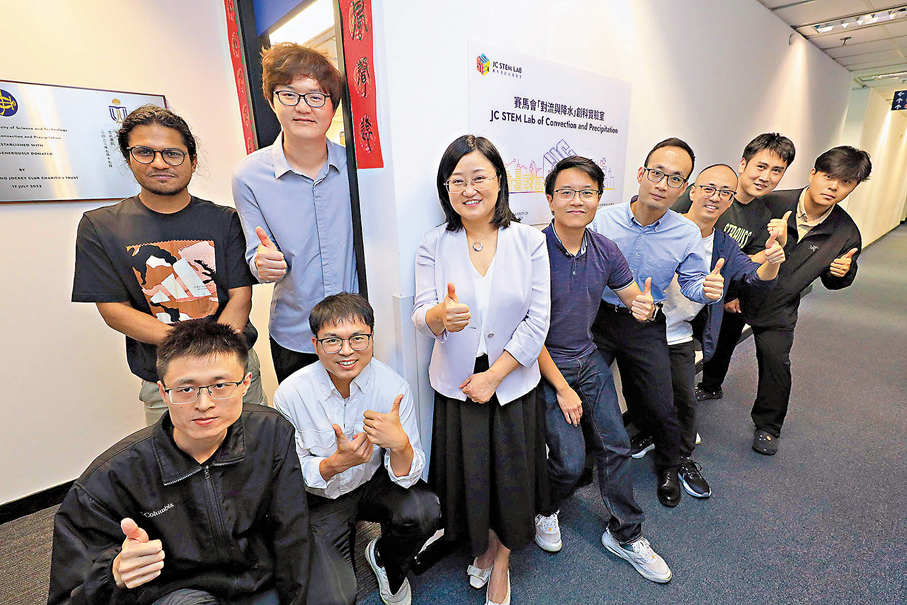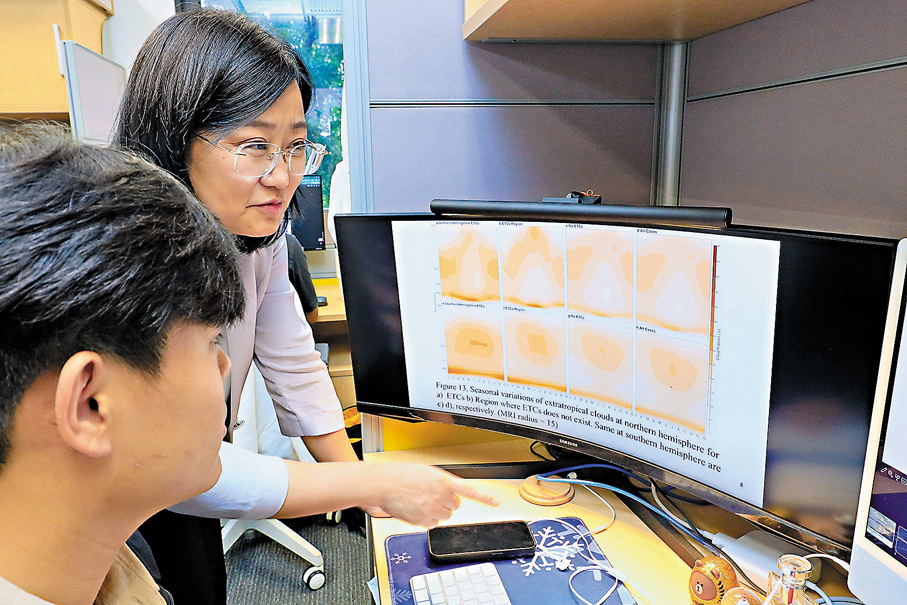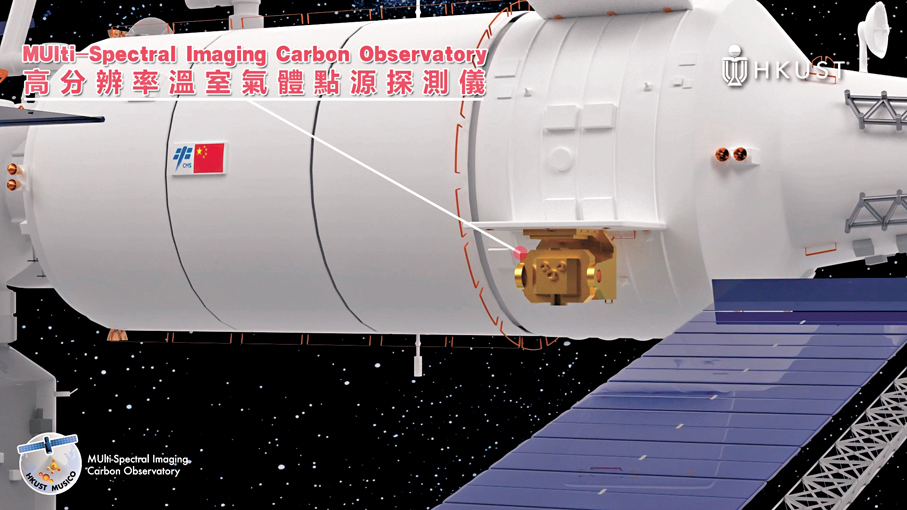Feature Interview | Former NASA Expert Su Hui Arrives in Hong Kong for Two Years, Researching Detection Instruments to Combat Climate Change
March 24, 2025 — Professor Hui Su, a “ Global STEM Professor” in the Department of Civil and Environmental Engineering Department at the Hong Kong University of Science and Technology (HKUST) and founder and chairperson of Stellerus Technology Limited, was interviewed by Wen Wei Po. The report is as follows:

Wen Wei Po published
Science and Technology as the Primary Productive Force. In the context of integrating into the national development framework, Hong Kong leverages its higher education advantages to attract top global science and technology talents, playing an important role in realizing the national strategy of “strengthening the country through science and education.” The Hong Kong Special Administrative Region government has seized the golden era of innovation and technology development in recent years, launching the “Global STEM Professorship” scheme to provide universities with more competitive conditions to attract internationally renowned “star scientists” and their teams to Hong Kong, further strengthening the city’s pool of innovation talents.
Professor Hui Su, who lived in the U.S. for over 20 years and formerly served as Chief Scientist at NASA’s Jet Propulsion Laboratory, came to Hong Kong more than two years ago through this scheme. She now serves as a professor in HKUST’s Department of Civil and Environmental Engineering and holds the title of “Global STEM Professor.” In the interview, Professor Su shared that Hong Kong’s unique research advantages and development potential were key factors in her decision to come. Moreover, the opportunity to leverage the support of the motherland has enabled her to lead the development of a payload instrument that is set to become the first Hong Kong payload to be launched to China’s “Tiangong” space station, contributing to climate change response efforts.
The “Global STEM Professorship” Scheme. The scheme pools about HKD 2 billion in resources from the government, universities, and society, aiming to recruit around 100 top international scientific and technological talents. Professor Su is among them. She candidly acknowledged that the scheme’s provision of sufficient funding and networking support was a critical factor in her choice to come to Hong Kong. “With the support of the government, the Hong Kong Jockey Club, and the university, I was able to establish the Jockey Club ‘Convection and Precipitation’ Innovation Laboratory, focusing on extreme rainfall research. Patriotic and Hong Kong-loving people from all walks of life generously donated, enabling us to quickly secure private funding support, providing a solid backing for our research,” she said.

Hui Su (right sixth) leads the Jockey Club's 'Convection and Precipitation' Innovation and Technology Laboratory team.
A Well-Established Academic System Backed by National Development Opportunities
Professor Su revealed that her decision to choose Hong Kong as a new starting point for her research career involved multiple considerations, including family factors. “After living in the U.S. for over 20 years, Hong Kong’s international environment made it easy for me to adapt, and I could also be closer to my family,” she said. She pointed out that Hong Kong’s free and open academic atmosphere, sound academic evaluation system, and the national strategic support for innovation and technology form a unique advantage. “The research environment here is connected with the West while backed by national development opportunities, providing an ideal place for scholars to realise innovation.”
As a senior editor of the flagship journal Geophysical Research Letters of the American Geophysical Union, Professor Su observed that among nearly 5,000 annual submissions, over 40% come from scholars in Mainland China and Hong Kong. “This simultaneous increase in quantity and quality reflects the rapid development and remarkable progress of the country’s scientific research level. Coupled with significant research funding, it has attracted a large number of outstanding talents with international perspectives to return, forming a virtuous cycle,” she said.
Professor Su cited that in recent years, Mainland China and Hong Kong have excelled in various world university rankings, with some disciplines surpassing those of British and American institutions. Hong Kong has five universities ranked among the world’s top 100, fully demonstrating the leading position of the country and Hong Kong in frontier research.
“From fundamental sciences such as mathematics, physics, and chemistry to biotechnology, aerospace, artificial intelligence, and quantum computing, the country and Hong Kong have established globally competitive research systems, with some research directions at the world-leading level.”

Professor Hui Su’s team studies “micro-changes” in atmospheric mechanisms.
Internationalisation Fosters Top-Level Exchange; Government Support Boosts Confidence
Professor Su emphasised Hong Kong’s unique advantages: “As a core hub in Asia, Hong Kong’s superior geographic location is its greatest natural advantage. It serves as a gateway connecting Mainland China and international markets, with a highly internationalised research environment that attracts top overseas scholars for exchange and collaboration, fully playing the role of a ‘super connector.’”She shared her own experience joining HKUST, noting that despite facing laboratory space constraints, the university actively coordinated to provide dedicated labs equipped with advanced research equipment and facilitated access to Mainland research data. She also highlighted the HKUST-led Generative AI Research Center (HKGAI), led by Chief Vice President Guo Yike, which, with support from the Innovation and Technology Bureau, has acquired cutting-edge computing resources to conduct large-scale AI research, reflecting Hong Kong society’s determination to build a top-tier research environment.

The payload instrument developed under HKUST’s leadership is expected to become the first Hong Kong Special Administrative Region payload to be launched to China’s “Tiangong” space station aboard the Tianzhou cargo spacecraft, initiating research and applications.
Source: Wen Wei Po






